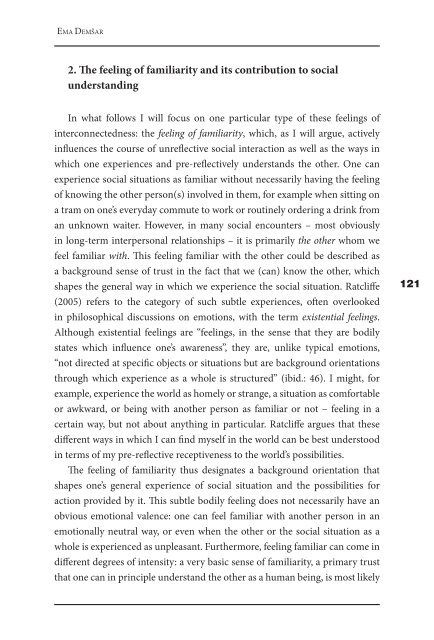phainomena
PHAINOMENA-98-99_e-verzija
PHAINOMENA-98-99_e-verzija
Create successful ePaper yourself
Turn your PDF publications into a flip-book with our unique Google optimized e-Paper software.
EMA DEMŠAR<br />
2. The feeling of familiarity and its contribution to social<br />
understanding<br />
In what follows I will focus on one particular type of these feelings of<br />
interconnectedness: the feeling of familiarity, which, as I will argue, actively<br />
influences the course of unreflective social interaction as well as the ways in<br />
which one experiences and pre-reflectively understands the other. One can<br />
experience social situations as familiar without necessarily having the feeling<br />
of knowing the other person(s) involved in them, for example when sitting on<br />
a tram on one’s everyday commute to work or routinely ordering a drink from<br />
an unknown waiter. However, in many social encounters – most obviously<br />
in long-term interpersonal relationships – it is primarily the other whom we<br />
feel familiar with. This feeling familiar with the other could be described as<br />
a background sense of trust in the fact that we (can) know the other, which<br />
shapes the general way in which we experience the social situation. Ratcliffe<br />
(2005) refers to the category of such subtle experiences, often overlooked<br />
in philosophical discussions on emotions, with the term existential feelings.<br />
Although existential feelings are “feelings, in the sense that they are bodily<br />
states which influence one’s awareness”, they are, unlike typical emotions,<br />
“not directed at specific objects or situations but are background orientations<br />
through which experience as a whole is structured” (ibid.: 46). I might, for<br />
example, experience the world as homely or strange, a situation as comfortable<br />
or awkward, or being with another person as familiar or not – feeling in a<br />
certain way, but not about anything in particular. Ratcliffe argues that these<br />
different ways in which I can find myself in the world can be best understood<br />
in terms of my pre-reflective receptiveness to the world’s possibilities.<br />
The feeling of familiarity thus designates a background orientation that<br />
shapes one’s general experience of social situation and the possibilities for<br />
action provided by it. This subtle bodily feeling does not necessarily have an<br />
obvious emotional valence: one can feel familiar with another person in an<br />
emotionally neutral way, or even when the other or the social situation as a<br />
whole is experienced as unpleasant. Furthermore, feeling familiar can come in<br />
different degrees of intensity: a very basic sense of familiarity, a primary trust<br />
that one can in principle understand the other as a human being, is most likely<br />
121


